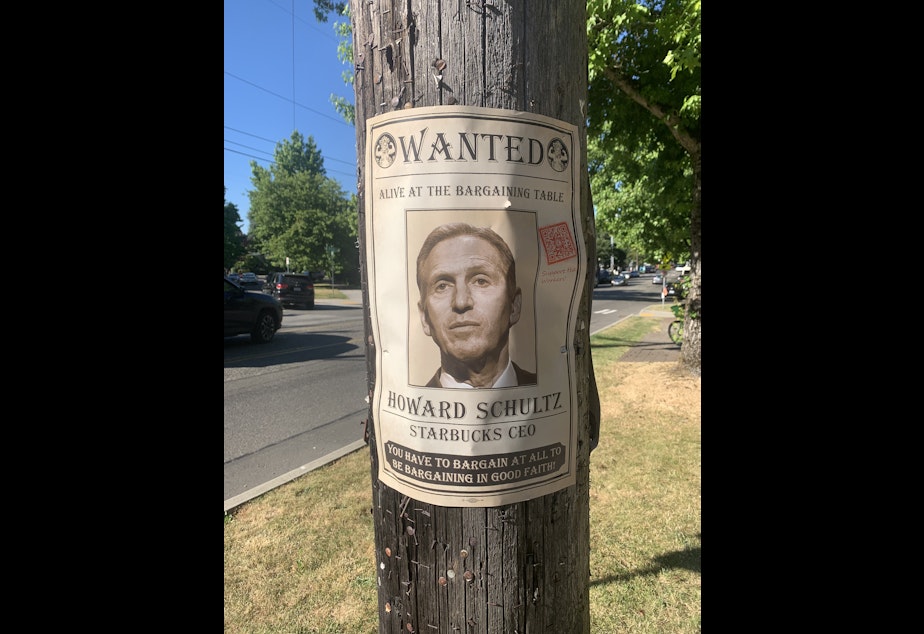'A different kind of capitalist.' What motivates Starbucks CEO Howard Schultz?

The unionization efforts of Starbucks employees have captured attention nationwide.
The vote to unionize out of a Starbucks store in Buffalo, New York, in December of last year sparked a chain reaction.
Starbucks locations across the country voted to collectively bargain, including the first Seattle area store at Broadway and Denny on Capitol Hill. To date, more than 200 locations have joined Starbucks Workers United.
At the center of it all is Starbucks CEO Howard Schultz, the executive who took the company public in 1992, and drove decades of meteoric expansion. He returned to lead Starbucks in an interim role earlier this year.
Since then, the company has closed multiple unionized stores, and recently a National Labor Relations Board judge ruled that Starbucks had illegally fired employees for union activism.
Washington Post labor reporter Greg Jaffe spent time with Howard Schultz this year and published a profile last week on the Starbucks CEO. He joined Soundside to discuss that profile, and how he would describe Schultz up close.
“As a person, he's very empathetic. That's what struck me as unusual about him both as a person as a as a CEO,” Jaffe explained. “But I think he also sees himself as a different kind of capitalist, someone who approaches capitalism from a more humane and philanthropic perspective.”
Sponsored
Under Shultz, Starbucks was one of the first corporations to offer health benefits even to employees only working 20 hours a week. They offered stock options, which helped employees buy houses and afford college. Starbucks also pioneered free college options for any employee working at least 20 hours through Arizona State University Online.
However, while Howard Schultz still sees employment at Starbucks as a “ladder to the middle class,” many current employees see the US economy stacked against them, with Starbucks as a part of that economy and fundamentally unfair toward them.
“I think Howard sees Starbucks as an oasis or a haven from all the chaos and frustration and anger of our everyday lives,” Jaffe says. “I'm not sure his workers see it that way.”
One of the ways that Schultz seems to reconcile this desire to be a benevolent capitalist leader while undermining unionization efforts is by portraying organizing employees as “bad actors” or “outside activists.” His claim that 20 of the pro-union votes at the Starbucks Roastery in Capitol Hill doesn’t have any validity, but…
“Howard believed it to be true,” Jaffe explained. “And so I think in some ways, he's convinced himself that Starbucks is they a victim of this kind of left wing, outside agitator movement that is trying to destroy the culture of his company.”
Sponsored
Since Jaffe’s profile published, more has come out about the fight for unionization at Starbucks. A Bloomberg article reported the story of a store manager in Buffalo, New York, who was allegedly told by Starbucks to find reasons to punish union affiliated employees for things like dress-code violations. A National Labor Relations Board judge ruled that Starbucks violated federal law by firing pro-union employees.
Jaffe says that while he doesn’t think there’s a direct order from Starbucks headquarters to specifically target unionized workers, there is still a message from the top saying that these baristas aren’t legitimate employees.
“You don't necessarily have to be told to target these people as they start to unionize in your store," Jaffe explained. “It's going to impact your career negatively. Perhaps you're going to be seen as a bad manager, because you didn't take care of your workers, and now they're unionizing.”
As for what we should take away from what’s happening in the re-surging labor movement in America, Jaffe says that while there is a very big window of opportunity for unions right now, the deck is stacked against them.
“In America right now, the law favors companies,” he explained. “And companies tend to see unionization as a form of punishment, rather than something that could potentially be good for their company.”





